英语八年级上上海新世纪Unit 3 lesson 1 Idioms with Body Parts 课件(42张)
文档属性
| 名称 | 英语八年级上上海新世纪Unit 3 lesson 1 Idioms with Body Parts 课件(42张) |

|
|
| 格式 | zip | ||
| 文件大小 | 374.4KB | ||
| 资源类型 | 教案 | ||
| 版本资源 | 上海新世纪版 | ||
| 科目 | 英语 | ||
| 更新时间 | 2017-05-14 13:10:43 | ||
图片预览

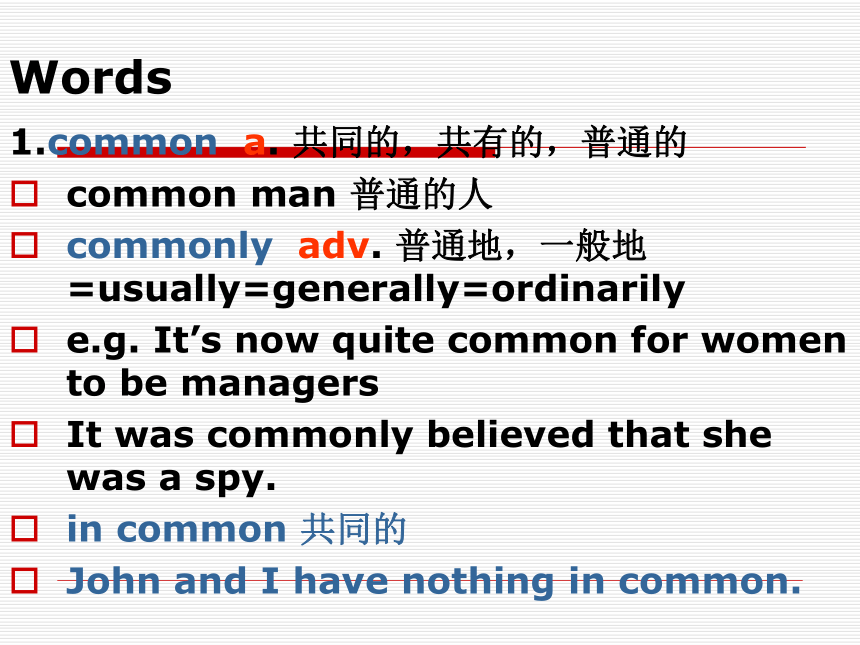
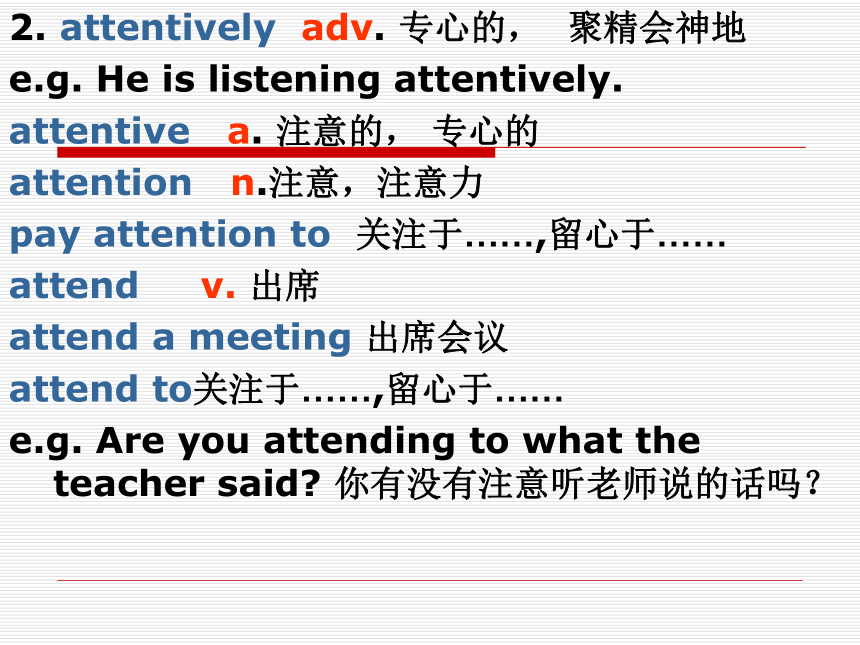
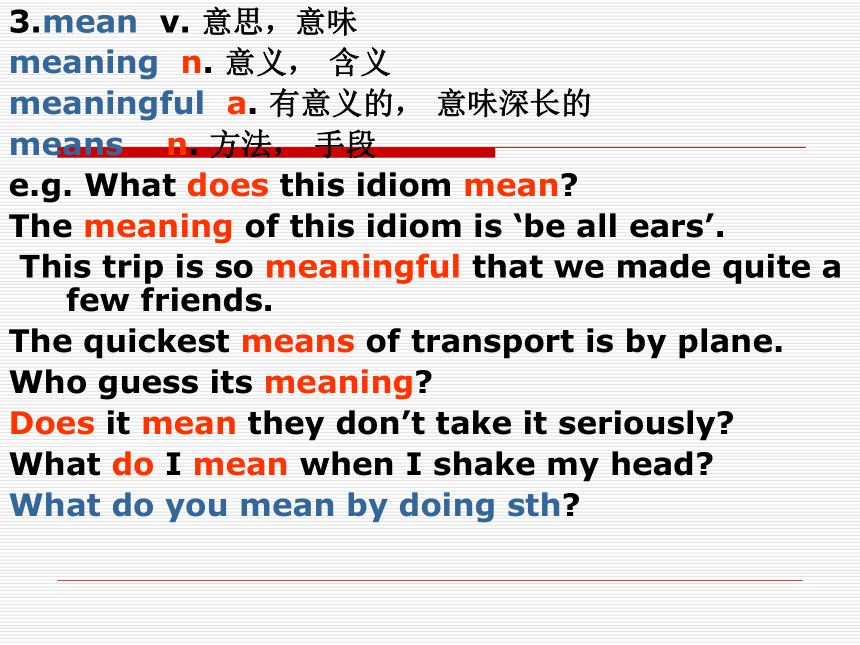
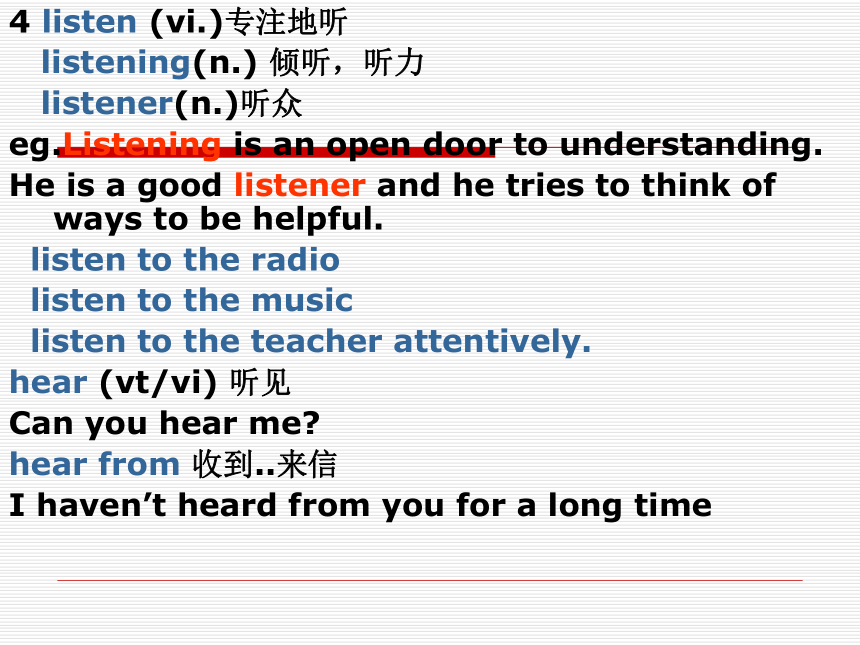
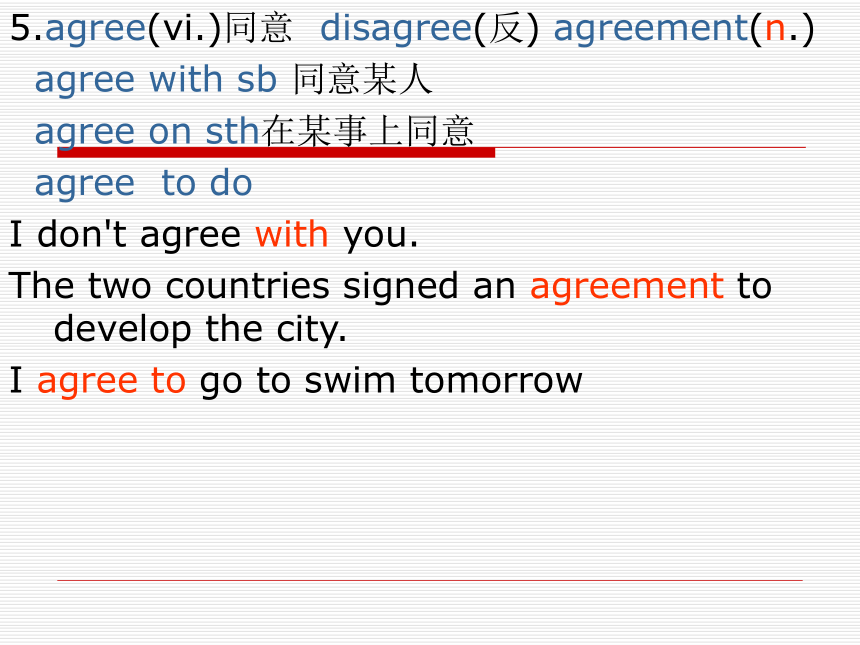
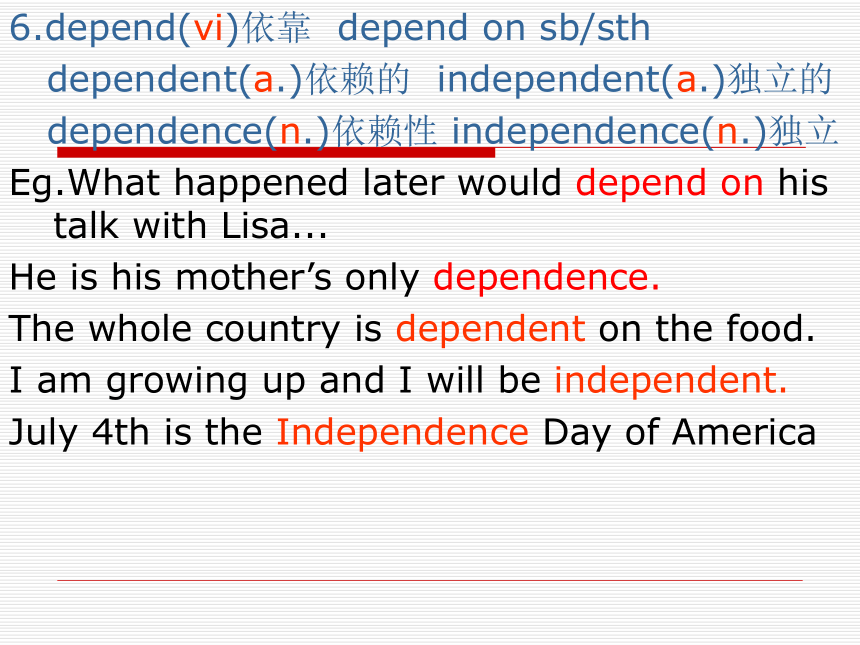

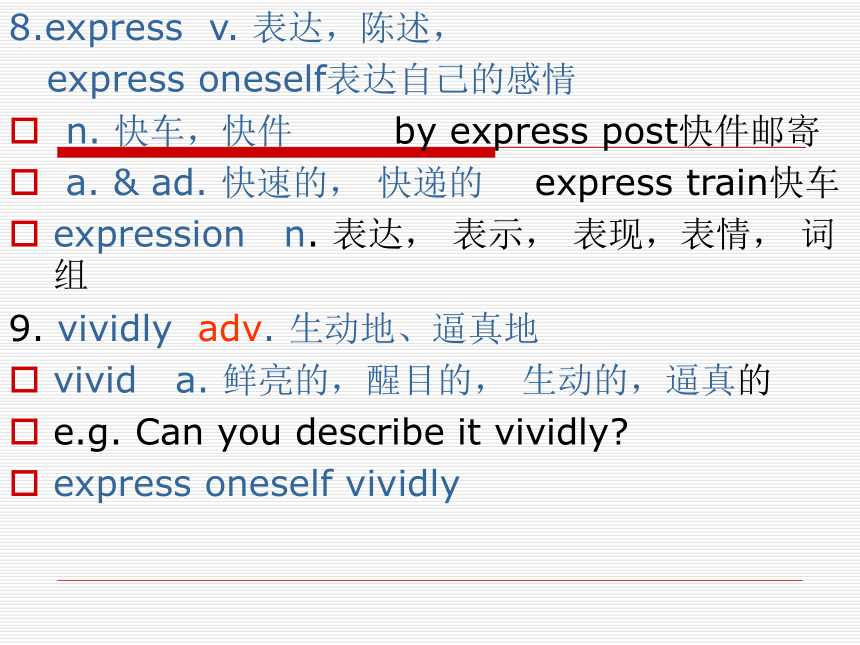
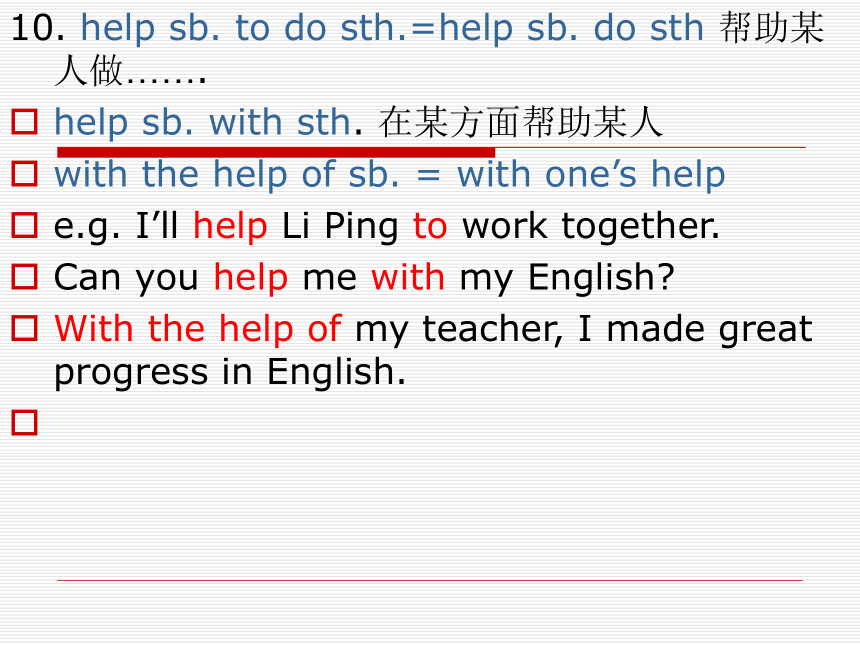

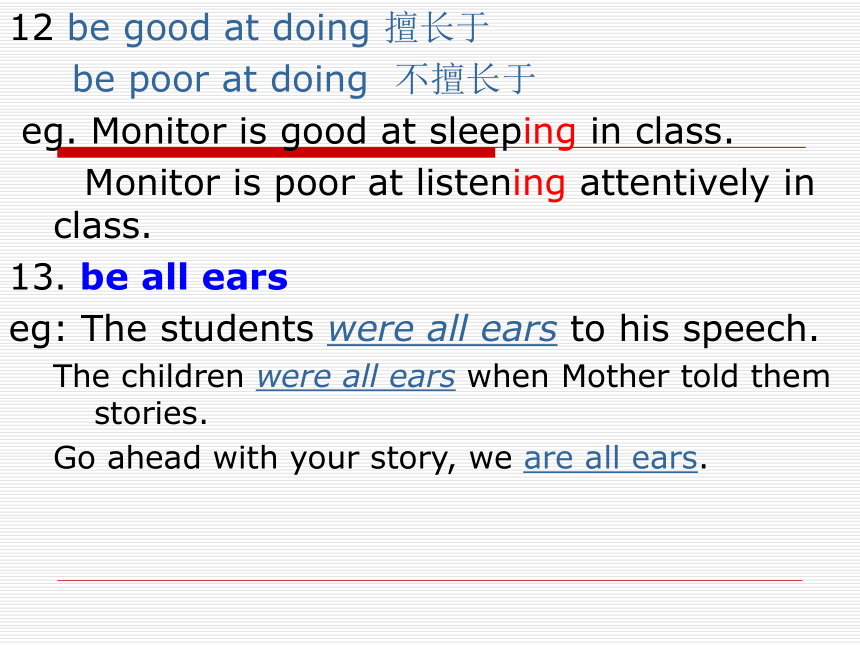
文档简介
课件42张PPT。Words1.common a. 共同的,共有的,普通的
common man 普通的人
commonly adv. 普通地,一般地 =usually=generally=ordinarily
e.g. It’s now quite common for women to be managers
It was commonly believed that she was a spy.
in common 共同的
John and I have nothing in common.2. attentively adv. 专心的, 聚精会神地
e.g. He is listening attentively.
attentive a. 注意的, 专心的
attention n.注意,注意力
pay attention to 关注于……,留心于……
attend v. 出席
attend a meeting 出席会议
attend to关注于……,留心于……
e.g. Are you attending to what the teacher said? 你有没有注意听老师说的话吗?3.mean v. 意思,意味
meaning n. 意义, 含义
meaningful a. 有意义的, 意味深长的
means n. 方法, 手段
e.g. What does this idiom mean?
The meaning of this idiom is ‘be all ears’.
This trip is so meaningful that we made quite a few friends.
The quickest means of transport is by plane.
Who guess its meaning?
Does it mean they don’t take it seriously?
What do I mean when I shake my head?
What do you mean by doing sth?4 listen (vi.)专注地听
listening(n.) 倾听,听力
listener(n.)听众
eg.Listening is an open door to understanding.
He is a good listener and he tries to think of ways to be helpful.
listen to the radio
listen to the music
listen to the teacher attentively.
hear (vt/vi) 听见
Can you hear me?
hear from 收到..来信
I haven’t heard from you for a long time
5.agree(vi.)同意 disagree(反) agreement(n.)
agree with sb 同意某人
agree on sth在某事上同意
agree to do
I don't agree with you.
The two countries signed an agreement to develop the city.
I agree to go to swim tomorrow 6.depend(vi)依靠 depend on sb/sth
dependent(a.)依赖的 independent(a.)独立的
dependence(n.)依赖性 independence(n.)独立
Eg.What happened later would depend on his talk with Lisa...
He is his mother’s only dependence.
The whole country is dependent on the food.
I am growing up and I will be independent.
July 4th is the Independence Day of America7.clumsy(a.)笨拙得 clumsiness(n.) clumsily( adv.)
clumsier—clumsiest
eg.Ben's biggest problem is clumsiness.
If this matter is done clumsily,it will cost Mary her life.
I’m not usually that clumsy.
8.express v. 表达,陈述,
express oneself表达自己的感情
n. 快车,快件 by express post快件邮寄
a. & ad. 快速的, 快递的 express train快车
expression n. 表达, 表示, 表现,表情, 词组
9. vividly adv. 生动地、逼真地
vivid a. 鲜亮的,醒目的, 生动的,逼真的
e.g. Can you describe it vividly?
express oneself vividly10. help sb. to do sth.=help sb. do sth 帮助某人做…….
help sb. with sth. 在某方面帮助某人
with the help of sb. = with one’s help
e.g. I’ll help Li Ping to work together.
Can you help me with my English?
With the help of my teacher, I made great progress in English.
11. discuss v. 讨论=talk about
discussion n. 讨论
have a discussion about= talk about
e.g. They had a discussion about this problem.
= They discussed about this problem.
=They talked about this problem.12 be good at doing 擅长于
be poor at doing 不擅长于
eg. Monitor is good at sleeping in class.
Monitor is poor at listening attentively in class.
13. be all ears
eg: The students were all ears to his speech.
The children were all ears when Mother told them stories.
Go ahead with your story, we are all ears.
14 teach---taught--teaches
teach sb(宾) sth / teach sb to do
Miss Cheng teaches us maths.
Miss Cheng teaches us to learn maths.
15. start
start/begin to do/doing
How old were you when you first started playing the piano?
16 loud (a.)---loudly(adv.)—louder
Don’t laugh and speak loudly in the classroom.17.serious(a.)严重的,严肃,严峻
seriously(adv.)
Eg. The government still face very serious difficulties
She didn’t take the teacher’s advice seriously.
18.Never mind 没关系=Don’t worry
`Did you miss the bus?
Never mind, there'll be another one in five
minutes.
I’m sorry,I’ve broken your glass.
Never mind.19.joke(n./v.)玩笑
Eg.No one told worse jokes than Tom.
Don't get angry, Charlie. I was only joking..
My brother couldn’t take a joke.
开玩笑:
Make fun of sb
Play a trick on sb ;
Pull someone's leg
Are you kidding me?
1.普通的(a.)---(adv.)---
共同的
2.专心的(adv.)----(a.)---(n.)---(v.)
关心……
出席会议
3.意思是(v.)----(n.)----(a.)----(n.)方式
谁能猜出它的意思?
你说….是什么意思?
如果我说….是什么意思?
它是什么意思?
4.专注得听(v.)----(n.)
听音乐 专注地听老师
听见(v.)--- 过去式 收到….来信
5.同意(v.)---(反义)-----(n.)
同意某人 同意做某事
6.依靠(v.) –(a.)----- (n.)
独立(a.)----(n.)
依靠某人/依赖于某事
在独立日
7.笨拙的(a.)----比较级---最高级----(adv.)
8.表达(v./a)----(n.)
表达自己
快车
9.生动的(a.)---(adv.)
生动地表达自己
10.讨论(v.)----(n.)
进行一场关于….的讨论
讨论关于…..
11.擅长于/不擅长于
12.帮助某人做某事
在某方面帮助人 在…的帮助下
Get familiar with some body parts1.eye
2.ear
3.mouth
4.teeth
5.eyeblow
6.cheek
7.chin
8.nose
9.tongue
10.eyeball
11.eyelids
12. forehead
13.hair
14.lip
15 head
6.arm [ɑ:m]
7.hand
8.thumb [θ?m]
9.back [b?k]
10.waist [weist]
11.leg:[leg]
12.knee [ni:]
13.foot
14.shoulder
finger
chest
Wrist
heart
f. 臂
g. 手
h. 拇指
i. 背脊,背部
腰,腰部
腿,足;小腿
l. 膝,膝盖,膝部
m. 脚
n.肩膀
o.手指
p.胸膛
q.手腕
r.心
Guessing gameIt goes in one ear and out the other-
I see eye to eye with you-
He’s got a green thumb .
He’s all ears .
You’ve just hit the nail on the head----
You should stand on your own feet.
You should learn it by heart-
He’s pulling your leg .
It will cost an arm and a leg.
I’m all thumbs-
She’s got him under her thumb
You’ve got a sweet toothYou’ve got a sweet tooth.
I see eye to eye with you.
He’s got a green thumb.
He’s all ears.
You’ve just hit the nail on the head. Match the following pictures with the appropriate idioms.You are so clever![nel] 3. Fill in the blanks with proper idioms and act the dialogue outP1 A: I’m sorry. I’ve broken your glass.
__________________________________ .
B:Never mind.P2 A: Hey,Jimmy. Your mum has come to see you.
B:???Really?
C:Don’t believe him,Jimmy.
__________________________________ .P3 A: How much is this computer?
B: Ten thouasnd yuan.
C: So expensive!
It__________________________________ .I am all thumbs.He’s pulling your leg.costs an arm and leg.Recite1.I see eye to eye with you----I agree with you.
2.He’s got a green thumb----He is good at gardening.
3.He’s all ears----He is listening attentively
4.You’ve just hit the nail on the head----You are right
5.You should learn it by heart----You should memorize it.
6.He’s pulling your leg— He is kidding
7.It will cost an arm and a leg.---It will cost a lot.
8.I’m all thumbs---I’m clumsy
9.You’ve got a sweet tooth— You like eating food with sugar in it
10. You should stand on your own feet.—You should be independent.1.____ He’s all ears.
2.____You’ve got a sweet tooth.
3.____You’ve just hit the nail on the head.
4.____I see eye to eye with you.
5.____I have a green thumb.a. I’m good at gardening
b. He is listening attentively.
c. I agree with you.
d. You like eating food with sugar in it.
e. You are right.a.b.c.d.e.What idioms with body parts do you know?I know one. It says “He’s all ears”. 1.Who’s in the picture?
2.What did the students do as soon as the English class began? Listen to the text and answer the questions.Dad. I’ve learned some English idioms with ______________today.
“he’s ________________.” It means he’s listening attentively. Another idioms is with “tooth”. That’s “You’ve got ___________ .
It means the listener likes________________________.
All right. When someone’s good at gardening, he’ll say “I’ve got ___________thumb”.
Here’s one. “I _______________ with you”.
You’ve just __________________________!Have you? What are they?
What does it ___________?
Interesting. Tell me more idioms,please.
That’s vivid. Are there any idioms with “eye”, WangQiang?
Does it mean “I ______________ you”?
Thanks.body partsall earsa sweet tootheating food with sugar in ita greensee eye to eyehit the nail on the headmeanagree withDeveloping SkillsListening and speakingFill in the blanks with proper idioms1. You've dropped my vase! It means:I ‘m all thumbs2.Although I spent 300 yuan on the game, finally I lost the game.It means:It cost me an arm and a leg.3. She can make him do everything for her.It means:She ‘s got him under her thumb4.I don't need your help .It means: I should stand on my own feet.5.These are very important language points.Tomorrow you’ll have a test.It means:You should learn it by heart.6. A: I’ll invite you to dinner tonight.It’s all on me
B:Really?
C:He invited me to go to movies last week.But I paid the tickets.It means:He’s pulling your leg.7. He pays attention to what teacher says in class.It means He’s all ears.8. A: The earths moves around the sun.
B:That’s correctIt means you’ve just hit the nail on the head.As soon as一…..就Model 1
A: What will the students do as soon as the bell rings?
B:They’ll start the discussion about idioms with body parts as soon as the bell rings. Model 2
A: What did the students do as soon as the bell rang?
B:They started the discussion about idioms with body parts as soon as the bell rang. Picture1 teach them some English idioms try to use them1 A: What will the students do as soon as the teacher teaches them some English idioms?
B: They’ll try to use the English idioms as soon as the teacher teaches them some English idioms.2 A: What did the students do as soon as the teacher taught them some English idioms?
B: They tried to use the English idioms as soon as the teacher taught them some English idioms.As soon as用法
1.时态应运用:主将从现或 主过从过,
2符号:从句可放在主句前或主句后,从句置于主句前时,须用逗号与主句隔开,反之则不用逗号。Combine the following sentences according to the model.1.He’ll tell me the news. I’ll let you know at once.
2.Father arrived. Bill gave him the message at once.After,Before, When,while,if,as soon as,sinceAfter: 主将从现,主过从过
Before:主将从现,主过从过
When:主将从现,过去式(过进),主现从现
While:过去式(过进)
If:主将从现
As soon as:主过从过,主将从现
Since 主现完从过
Fill in the blanks with the verbs in their proper forms1.The meeting__(begin) as soon as the class teacher_____(arrive).
2.When I _____(walk) home, I _____(see) Sue.
3.I _____(go) to see a film after I _____(finish) cleaning the room this afternoon.
4.Before we___(fly) back to London yesterday, we __________(visit) a few interesting places here.
5.If it _____(rain) tomorrow, we ____(stay) at home and _______(watch) TV.
6.Yesterday he ____(watch) cartoons as soon as he ____________(finish) his homework..
7.As soon as I ____(graduate), I ____(go) traveling.Gestures/body languagea smile and handshake
Welcome
waving the hand
say "goodbye",
nodding the head
-agreement
shaking the head
disagreement
putting up a hand
May I ask a question? Gestures/body languagegiving a flying kiss
Love
putting index finger up to one’s lips
be quiet
putting your hand beside your ear
pardon?
moving the fingers back and forth with palm down.
come here
extending the middle finger
An insultDifferent countries and gesturesGreeting:
Arab men ----
by kissing on both cheeks.
Japanese:
by bowing.
Amercain
By shaking hands
Putting a hand on a person's neck:
Chinese
"someone will be killed"
American
I’m fullCrossing one's legs:
Americans
I relax myself
Korean
it's not allowed.
Joining the thumb and the index finger in a circle
Many countries:
saying Ok
Frenchman
read it as zero
South American
An insultHomeworkRecite the text.
Make up your own dialogues with as soon as.
Complete the Language Focus I,II,IV,V.
common man 普通的人
commonly adv. 普通地,一般地 =usually=generally=ordinarily
e.g. It’s now quite common for women to be managers
It was commonly believed that she was a spy.
in common 共同的
John and I have nothing in common.2. attentively adv. 专心的, 聚精会神地
e.g. He is listening attentively.
attentive a. 注意的, 专心的
attention n.注意,注意力
pay attention to 关注于……,留心于……
attend v. 出席
attend a meeting 出席会议
attend to关注于……,留心于……
e.g. Are you attending to what the teacher said? 你有没有注意听老师说的话吗?3.mean v. 意思,意味
meaning n. 意义, 含义
meaningful a. 有意义的, 意味深长的
means n. 方法, 手段
e.g. What does this idiom mean?
The meaning of this idiom is ‘be all ears’.
This trip is so meaningful that we made quite a few friends.
The quickest means of transport is by plane.
Who guess its meaning?
Does it mean they don’t take it seriously?
What do I mean when I shake my head?
What do you mean by doing sth?4 listen (vi.)专注地听
listening(n.) 倾听,听力
listener(n.)听众
eg.Listening is an open door to understanding.
He is a good listener and he tries to think of ways to be helpful.
listen to the radio
listen to the music
listen to the teacher attentively.
hear (vt/vi) 听见
Can you hear me?
hear from 收到..来信
I haven’t heard from you for a long time
5.agree(vi.)同意 disagree(反) agreement(n.)
agree with sb 同意某人
agree on sth在某事上同意
agree to do
I don't agree with you.
The two countries signed an agreement to develop the city.
I agree to go to swim tomorrow 6.depend(vi)依靠 depend on sb/sth
dependent(a.)依赖的 independent(a.)独立的
dependence(n.)依赖性 independence(n.)独立
Eg.What happened later would depend on his talk with Lisa...
He is his mother’s only dependence.
The whole country is dependent on the food.
I am growing up and I will be independent.
July 4th is the Independence Day of America7.clumsy(a.)笨拙得 clumsiness(n.) clumsily( adv.)
clumsier—clumsiest
eg.Ben's biggest problem is clumsiness.
If this matter is done clumsily,it will cost Mary her life.
I’m not usually that clumsy.
8.express v. 表达,陈述,
express oneself表达自己的感情
n. 快车,快件 by express post快件邮寄
a. & ad. 快速的, 快递的 express train快车
expression n. 表达, 表示, 表现,表情, 词组
9. vividly adv. 生动地、逼真地
vivid a. 鲜亮的,醒目的, 生动的,逼真的
e.g. Can you describe it vividly?
express oneself vividly10. help sb. to do sth.=help sb. do sth 帮助某人做…….
help sb. with sth. 在某方面帮助某人
with the help of sb. = with one’s help
e.g. I’ll help Li Ping to work together.
Can you help me with my English?
With the help of my teacher, I made great progress in English.
11. discuss v. 讨论=talk about
discussion n. 讨论
have a discussion about= talk about
e.g. They had a discussion about this problem.
= They discussed about this problem.
=They talked about this problem.12 be good at doing 擅长于
be poor at doing 不擅长于
eg. Monitor is good at sleeping in class.
Monitor is poor at listening attentively in class.
13. be all ears
eg: The students were all ears to his speech.
The children were all ears when Mother told them stories.
Go ahead with your story, we are all ears.
14 teach---taught--teaches
teach sb(宾) sth / teach sb to do
Miss Cheng teaches us maths.
Miss Cheng teaches us to learn maths.
15. start
start/begin to do/doing
How old were you when you first started playing the piano?
16 loud (a.)---loudly(adv.)—louder
Don’t laugh and speak loudly in the classroom.17.serious(a.)严重的,严肃,严峻
seriously(adv.)
Eg. The government still face very serious difficulties
She didn’t take the teacher’s advice seriously.
18.Never mind 没关系=Don’t worry
`Did you miss the bus?
Never mind, there'll be another one in five
minutes.
I’m sorry,I’ve broken your glass.
Never mind.19.joke(n./v.)玩笑
Eg.No one told worse jokes than Tom.
Don't get angry, Charlie. I was only joking..
My brother couldn’t take a joke.
开玩笑:
Make fun of sb
Play a trick on sb ;
Pull someone's leg
Are you kidding me?
1.普通的(a.)---(adv.)---
共同的
2.专心的(adv.)----(a.)---(n.)---(v.)
关心……
出席会议
3.意思是(v.)----(n.)----(a.)----(n.)方式
谁能猜出它的意思?
你说….是什么意思?
如果我说….是什么意思?
它是什么意思?
4.专注得听(v.)----(n.)
听音乐 专注地听老师
听见(v.)--- 过去式 收到….来信
5.同意(v.)---(反义)-----(n.)
同意某人 同意做某事
6.依靠(v.) –(a.)----- (n.)
独立(a.)----(n.)
依靠某人/依赖于某事
在独立日
7.笨拙的(a.)----比较级---最高级----(adv.)
8.表达(v./a)----(n.)
表达自己
快车
9.生动的(a.)---(adv.)
生动地表达自己
10.讨论(v.)----(n.)
进行一场关于….的讨论
讨论关于…..
11.擅长于/不擅长于
12.帮助某人做某事
在某方面帮助人 在…的帮助下
Get familiar with some body parts1.eye
2.ear
3.mouth
4.teeth
5.eyeblow
6.cheek
7.chin
8.nose
9.tongue
10.eyeball
11.eyelids
12. forehead
13.hair
14.lip
15 head
6.arm [ɑ:m]
7.hand
8.thumb [θ?m]
9.back [b?k]
10.waist [weist]
11.leg:[leg]
12.knee [ni:]
13.foot
14.shoulder
finger
chest
Wrist
heart
f. 臂
g. 手
h. 拇指
i. 背脊,背部
腰,腰部
腿,足;小腿
l. 膝,膝盖,膝部
m. 脚
n.肩膀
o.手指
p.胸膛
q.手腕
r.心
Guessing gameIt goes in one ear and out the other-
I see eye to eye with you-
He’s got a green thumb .
He’s all ears .
You’ve just hit the nail on the head----
You should stand on your own feet.
You should learn it by heart-
He’s pulling your leg .
It will cost an arm and a leg.
I’m all thumbs-
She’s got him under her thumb
You’ve got a sweet toothYou’ve got a sweet tooth.
I see eye to eye with you.
He’s got a green thumb.
He’s all ears.
You’ve just hit the nail on the head. Match the following pictures with the appropriate idioms.You are so clever![nel] 3. Fill in the blanks with proper idioms and act the dialogue outP1 A: I’m sorry. I’ve broken your glass.
__________________________________ .
B:Never mind.P2 A: Hey,Jimmy. Your mum has come to see you.
B:???Really?
C:Don’t believe him,Jimmy.
__________________________________ .P3 A: How much is this computer?
B: Ten thouasnd yuan.
C: So expensive!
It__________________________________ .I am all thumbs.He’s pulling your leg.costs an arm and leg.Recite1.I see eye to eye with you----I agree with you.
2.He’s got a green thumb----He is good at gardening.
3.He’s all ears----He is listening attentively
4.You’ve just hit the nail on the head----You are right
5.You should learn it by heart----You should memorize it.
6.He’s pulling your leg— He is kidding
7.It will cost an arm and a leg.---It will cost a lot.
8.I’m all thumbs---I’m clumsy
9.You’ve got a sweet tooth— You like eating food with sugar in it
10. You should stand on your own feet.—You should be independent.1.____ He’s all ears.
2.____You’ve got a sweet tooth.
3.____You’ve just hit the nail on the head.
4.____I see eye to eye with you.
5.____I have a green thumb.a. I’m good at gardening
b. He is listening attentively.
c. I agree with you.
d. You like eating food with sugar in it.
e. You are right.a.b.c.d.e.What idioms with body parts do you know?I know one. It says “He’s all ears”. 1.Who’s in the picture?
2.What did the students do as soon as the English class began? Listen to the text and answer the questions.Dad. I’ve learned some English idioms with ______________today.
“he’s ________________.” It means he’s listening attentively. Another idioms is with “tooth”. That’s “You’ve got ___________ .
It means the listener likes________________________.
All right. When someone’s good at gardening, he’ll say “I’ve got ___________thumb”.
Here’s one. “I _______________ with you”.
You’ve just __________________________!Have you? What are they?
What does it ___________?
Interesting. Tell me more idioms,please.
That’s vivid. Are there any idioms with “eye”, WangQiang?
Does it mean “I ______________ you”?
Thanks.body partsall earsa sweet tootheating food with sugar in ita greensee eye to eyehit the nail on the headmeanagree withDeveloping SkillsListening and speakingFill in the blanks with proper idioms1. You've dropped my vase! It means:I ‘m all thumbs2.Although I spent 300 yuan on the game, finally I lost the game.It means:It cost me an arm and a leg.3. She can make him do everything for her.It means:She ‘s got him under her thumb4.I don't need your help .It means: I should stand on my own feet.5.These are very important language points.Tomorrow you’ll have a test.It means:You should learn it by heart.6. A: I’ll invite you to dinner tonight.It’s all on me
B:Really?
C:He invited me to go to movies last week.But I paid the tickets.It means:He’s pulling your leg.7. He pays attention to what teacher says in class.It means He’s all ears.8. A: The earths moves around the sun.
B:That’s correctIt means you’ve just hit the nail on the head.As soon as一…..就Model 1
A: What will the students do as soon as the bell rings?
B:They’ll start the discussion about idioms with body parts as soon as the bell rings. Model 2
A: What did the students do as soon as the bell rang?
B:They started the discussion about idioms with body parts as soon as the bell rang. Picture1 teach them some English idioms try to use them1 A: What will the students do as soon as the teacher teaches them some English idioms?
B: They’ll try to use the English idioms as soon as the teacher teaches them some English idioms.2 A: What did the students do as soon as the teacher taught them some English idioms?
B: They tried to use the English idioms as soon as the teacher taught them some English idioms.As soon as用法
1.时态应运用:主将从现或 主过从过,
2符号:从句可放在主句前或主句后,从句置于主句前时,须用逗号与主句隔开,反之则不用逗号。Combine the following sentences according to the model.1.He’ll tell me the news. I’ll let you know at once.
2.Father arrived. Bill gave him the message at once.After,Before, When,while,if,as soon as,sinceAfter: 主将从现,主过从过
Before:主将从现,主过从过
When:主将从现,过去式(过进),主现从现
While:过去式(过进)
If:主将从现
As soon as:主过从过,主将从现
Since 主现完从过
Fill in the blanks with the verbs in their proper forms1.The meeting__(begin) as soon as the class teacher_____(arrive).
2.When I _____(walk) home, I _____(see) Sue.
3.I _____(go) to see a film after I _____(finish) cleaning the room this afternoon.
4.Before we___(fly) back to London yesterday, we __________(visit) a few interesting places here.
5.If it _____(rain) tomorrow, we ____(stay) at home and _______(watch) TV.
6.Yesterday he ____(watch) cartoons as soon as he ____________(finish) his homework..
7.As soon as I ____(graduate), I ____(go) traveling.Gestures/body languagea smile and handshake
Welcome
waving the hand
say "goodbye",
nodding the head
-agreement
shaking the head
disagreement
putting up a hand
May I ask a question? Gestures/body languagegiving a flying kiss
Love
putting index finger up to one’s lips
be quiet
putting your hand beside your ear
pardon?
moving the fingers back and forth with palm down.
come here
extending the middle finger
An insultDifferent countries and gesturesGreeting:
Arab men ----
by kissing on both cheeks.
Japanese:
by bowing.
Amercain
By shaking hands
Putting a hand on a person's neck:
Chinese
"someone will be killed"
American
I’m fullCrossing one's legs:
Americans
I relax myself
Korean
it's not allowed.
Joining the thumb and the index finger in a circle
Many countries:
saying Ok
Frenchman
read it as zero
South American
An insultHomeworkRecite the text.
Make up your own dialogues with as soon as.
Complete the Language Focus I,II,IV,V.
同课章节目录
- Unit 1 Modern Technology
- Lesson 1 Computers
- Lesson 2 Robots
- Lesson 3 Household Appliances
- Progress Check 1
- Unit 2 Culture and Customs
- Lesson 1 Visiting a British Family
- Lesson 2 Eating Out
- Progress Check 2
- Unit 3 Knowledge of Common Interest
- Lesson 1 Idioms with Body Parts
- Lesson 2 Exhibitions and Museums
- Lesson 3 Wonders of the World
- Progress Check 3
- Unit 4 Animals and Plants
- Lesson 1 A Visit to an Agricultural Park
- Lesson 2 For or Against Keeping Pets?
- Progress Check 4
